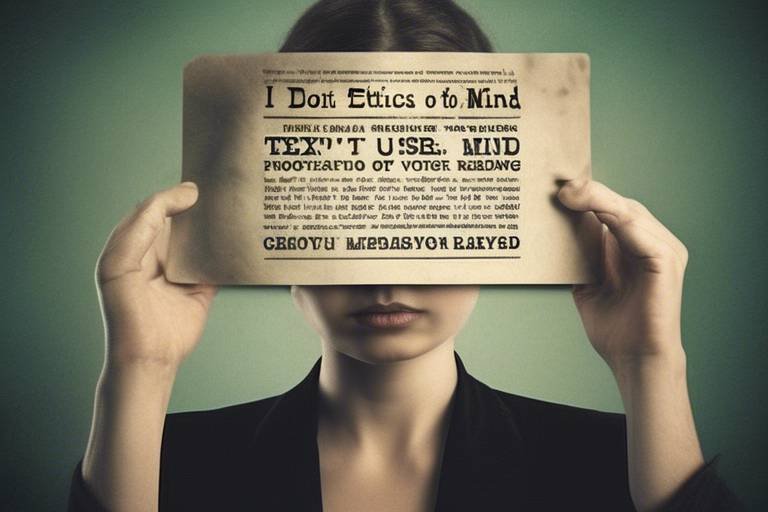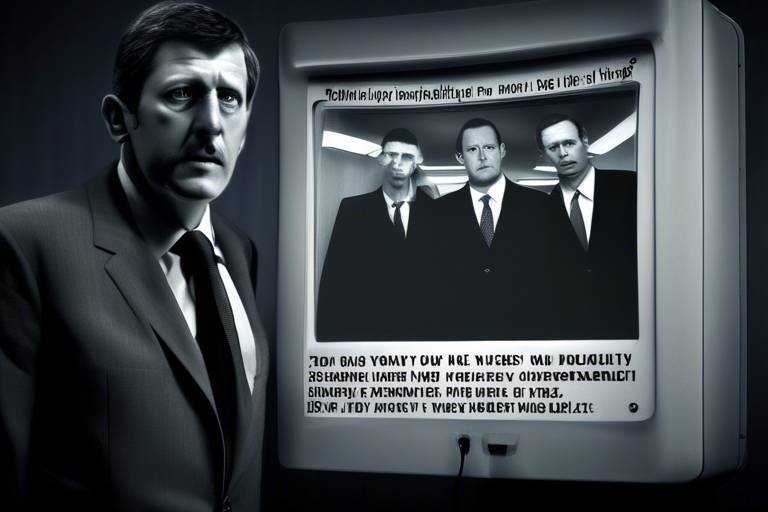The Morality of Vaccinations - A Modern Perspective
In today's world, the discussion surrounding vaccinations transcends mere medical advice; it delves deep into the fabric of our ethical beliefs and societal norms. As we navigate through a landscape filled with diverse opinions and heated debates, the question arises: what is the moral stance on vaccinations? This article aims to explore the intricate web of ethical implications surrounding vaccinations, examining the delicate balance between individual rights and community health. In a society that values personal freedom, how do we reconcile the need for public health with the autonomy of the individual?
The tension between individual autonomy and the collective good is a central theme in vaccination debates, raising profound questions about personal freedoms and societal obligations. On one hand, we cherish our rights to make choices about our bodies and medical treatments. On the other hand, when these choices have the potential to impact the health of the community, the stakes become much higher. Imagine a scenario where one person's decision not to vaccinate could lead to an outbreak of a preventable disease. This is where the ethical dilemma intensifies. Are we willing to sacrifice the well-being of the many for the choice of the few? The answer isn't straightforward, as it requires a nuanced understanding of both individual rights and public health imperatives.
Different ethical theories provide distinct lenses through which to evaluate the morality of vaccinations. Two prominent frameworks often discussed in this context are utilitarianism and deontology. Utilitarianism focuses on the outcomes of actions, positing that the best action is the one that maximizes overall happiness or well-being. In the case of vaccinations, this perspective argues that the benefits of immunization—such as herd immunity and reduced disease prevalence—far outweigh the risks associated with vaccination. Conversely, deontological ethics emphasizes duties and principles, suggesting that individuals have a moral obligation to vaccinate to protect others. This view frames vaccination not just as a personal choice but as a societal responsibility.
Utilitarianism emphasizes the greatest good for the greatest number. From this standpoint, vaccinations are seen as a crucial component of public health strategies. When a significant portion of the population is vaccinated, it creates herd immunity, which protects those who cannot be vaccinated, such as infants or individuals with compromised immune systems. The moral argument here is compelling: by vaccinating, we contribute to the well-being of the entire community. This principle has led some governments to consider mandates for vaccinations, especially during public health crises. However, the question remains: should personal freedoms be overridden for the sake of collective health?
Analyzing historical vaccination programs reveals how utilitarian principles have effectively reduced disease prevalence. For instance, the eradication of smallpox is a testament to the power of widespread immunization. Through coordinated global efforts, smallpox was declared eradicated in 1980, showcasing the moral imperative of protecting vulnerable populations through vaccinations. This success story serves as a powerful reminder of what can be achieved when we prioritize collective health over individual hesitations.
While utilitarianism supports vaccination, critics argue that it may overlook individual rights and the importance of informed consent. The potential for coercion in public health mandates raises ethical concerns about personal autonomy. Striking a balance between collective benefits and respect for personal choices is essential. It's crucial to ensure that individuals are not only informed but also feel empowered to make decisions about their health without undue pressure.
Deontological ethics shifts the focus from outcomes to duties and principles. It suggests that individuals have a moral obligation to vaccinate in order to protect others. This perspective frames vaccination as a societal responsibility, emphasizing that our actions (or inactions) can have far-reaching consequences. By choosing to vaccinate, we acknowledge our role in safeguarding the health of our communities. This ethical framework underscores the idea that public health is a shared responsibility, where each individual plays a part in fostering a healthier society.
The spread of misinformation about vaccines poses significant ethical challenges, complicating public understanding and trust. In an age where information is abundant yet often misleading, distinguishing fact from fiction becomes increasingly difficult. Misinformation can undermine efforts to achieve high vaccination rates necessary for community immunity. It raises the question: how do we navigate a landscape filled with conflicting information while ensuring that the public remains informed and empowered?
Understanding the roots of vaccine hesitancy is crucial for developing effective communication strategies. Many individuals harbor genuine concerns about vaccines, often stemming from personal experiences or cultural beliefs. Acknowledging these concerns while promoting the importance of vaccinations for public health is essential. By fostering open dialogues and providing accurate information, we can build trust and encourage informed decision-making.
Efforts to counter misinformation involve collaboration between healthcare professionals, policymakers, and communities. Accurate information must be made accessible to foster informed decision-making regarding vaccinations. This collaborative approach not only helps to dispel myths but also empowers individuals to make choices that align with their values while considering the well-being of the community.
- Why are vaccinations important for public health? Vaccinations help prevent the spread of infectious diseases, protecting both individuals and communities.
- What are the ethical considerations surrounding vaccinations? Ethical considerations include the balance between individual rights and public health responsibilities.
- How can misinformation about vaccines be addressed? Combating misinformation requires collaboration between healthcare professionals and communities to provide accurate information.
- What is herd immunity? Herd immunity occurs when a significant portion of the population is vaccinated, protecting those who cannot be vaccinated.

Individual Rights vs. Public Health
The debate surrounding vaccinations often brings to light a profound tension between individual rights and public health. On one hand, we have the principle that individuals should have the freedom to make choices about their own bodies, including whether or not to receive a vaccine. This notion of personal autonomy is deeply embedded in many democratic societies, where the rights of the individual are often placed above collective needs. But what happens when these personal choices begin to impact the health and safety of the community at large? This is where the conversation gets tricky.
Imagine a small town where everyone decides not to get vaccinated. Initially, it seems like a victory for personal choice, but then an outbreak of a preventable disease occurs. Suddenly, the individual decisions have consequences that ripple through the community, affecting those who cannot be vaccinated due to medical reasons, such as infants or individuals with compromised immune systems. This scenario illustrates the delicate balance we must strike between respecting individual freedoms and ensuring the health of the population as a whole.
To better understand this balance, we can consider the concept of herd immunity. Herd immunity occurs when a significant portion of a population becomes immune to a disease, either through vaccination or previous infections, thereby providing a degree of protection for individuals who are not immune. When vaccination rates drop, the risk of disease outbreaks increases, which can lead to devastating consequences. This raises the question: Should the community have the right to impose vaccination mandates to protect its most vulnerable members?
Furthermore, the ethical implications extend beyond just health outcomes. They also touch on issues of social justice. Communities that may be less educated or have less access to healthcare resources often face higher rates of vaccine-preventable diseases. This inequity complicates the discussion, as it highlights how individual rights can intersect with systemic issues that affect public health.
In light of these complexities, it becomes essential to foster open dialogues that respect both individual choices and the collective responsibility we share. Engaging in community discussions, providing clear and accessible information about the benefits of vaccination, and addressing concerns with empathy can create a more informed public that understands the importance of balancing personal rights with the health needs of the community.
Ultimately, the conversation about individual rights versus public health is not just a black-and-white issue. It’s a nuanced debate that requires us to consider the implications of our choices on others. By recognizing the interconnectedness of our health and well-being, we can work towards solutions that honor both personal autonomy and the collective good.
- What is herd immunity? Herd immunity occurs when a large portion of the population becomes immune to a disease, which helps protect those who cannot be vaccinated.
- Why is vaccination important for public health? Vaccination helps prevent the spread of infectious diseases, protecting both individuals and communities, especially the most vulnerable.
- How can I address my concerns about vaccines? It's important to discuss your concerns with a healthcare professional who can provide accurate information and support informed decision-making.

Ethical Frameworks in Vaccination
The discussion surrounding vaccinations is not just a matter of science; it delves deep into the realm of ethics. Different ethical frameworks provide unique perspectives on the morality of vaccinations, influencing both public policy and personal choices. Two of the most prominent frameworks in this debate are utilitarianism and deontological ethics. Understanding these frameworks helps clarify the complex relationship between individual rights and public health responsibilities.
Utilitarianism is a consequentialist theory that prioritizes the outcomes of actions. It suggests that the rightness of an action is determined by its contribution to overall happiness or well-being. In the context of vaccinations, this means that immunizing a population leads to greater societal benefits, such as herd immunity. When a significant portion of the community is vaccinated, it drastically reduces the spread of infectious diseases, protecting those who cannot be vaccinated, such as infants or individuals with compromised immune systems. This perspective supports the idea that mandatory vaccination policies can be justified as they promote the greatest good for the greatest number.
On the other hand, deontological ethics focuses on the morality of actions themselves rather than their consequences. This framework posits that individuals have a duty to act in ways that uphold moral principles. From this viewpoint, vaccination is framed as a moral obligation. Individuals are seen as having a responsibility to protect not only themselves but also their community. This sense of duty can be particularly compelling in the context of public health, where the actions of one person can significantly impact the well-being of others.
To illustrate the practical implications of these ethical frameworks, consider the following table that summarizes their key tenets in relation to vaccination:
| Ethical Framework | Key Principle | Implications for Vaccination |
|---|---|---|
| Utilitarianism | The greatest good for the greatest number | Supports mandatory vaccinations to achieve herd immunity |
| Deontological Ethics | Moral duty and principles | Frames vaccination as a societal responsibility |
While both frameworks provide valuable insights, they also come with critiques. Utilitarianism, for example, may be criticized for potentially sacrificing individual rights for the sake of collective benefits. This raises important questions about informed consent and the autonomy of individuals in making health decisions. On the flip side, deontological ethics may be seen as overly rigid, potentially disregarding the practical realities of vaccination programs in favor of moral absolutes.
Ultimately, the ethical landscape of vaccinations is complex and multifaceted. As society grapples with these issues, it is crucial to foster an open dialogue that respects both individual rights and the collective good. Engaging in discussions about these ethical frameworks can help bridge the gap between personal choice and public responsibility, leading to more informed and compassionate approaches to vaccination.
- What is the main ethical argument for vaccinations?
The main ethical argument for vaccinations is rooted in utilitarianism, which advocates for the greatest good for the greatest number, emphasizing herd immunity and community health. - How does deontological ethics view vaccinations?
Deontological ethics views vaccinations as a moral obligation, framing them as a duty individuals have to protect others in their community. - Can individual rights conflict with public health goals?
Yes, individual rights can sometimes conflict with public health goals, leading to debates about informed consent and mandatory vaccination policies.

Utilitarian Perspectives
When we dive into the world of utilitarianism, it’s like stepping into a grand balancing act where the scales tip towards the greater good. This ethical framework, which champions the idea of maximizing happiness and minimizing suffering for the largest number of people, provides a compelling argument in favor of vaccinations. Think about it: when a significant portion of a population is vaccinated against a contagious disease, we create a protective barrier known as herd immunity. This phenomenon not only safeguards those who are vaccinated but also protects those who cannot be vaccinated due to medical reasons, such as allergies or compromised immune systems.
In essence, the utilitarian perspective posits that the benefits of widespread vaccination extend far beyond the individual. By immunizing ourselves, we contribute to a healthier community, reducing the overall prevalence of diseases that can lead to outbreaks. Imagine a community where everyone is vaccinated; it’s like a well-oiled machine running smoothly without the threat of illness disrupting daily life. The idea here is that the collective health of society is paramount, and vaccinations play a crucial role in achieving that.
To illustrate this point further, let’s consider some key benefits of vaccinations from a utilitarian standpoint:
- Reduction in Disease Spread: Vaccinations significantly lower the transmission rates of contagious diseases, which means fewer people get sick.
- Protection of Vulnerable Populations: Those who cannot receive vaccines, like infants and individuals with certain health conditions, rely on herd immunity for their protection.
- Economic Benefits: Fewer illnesses lead to lower healthcare costs and less time off work, benefiting the economy as a whole.
However, while utilitarianism paints a rosy picture of vaccinations, it’s essential to acknowledge that this perspective is not without its critics. Detractors argue that the utilitarian approach may overlook the rights of individuals, particularly when it comes to informed consent. After all, the emphasis on the collective good can sometimes overshadow personal autonomy, leading to ethical dilemmas about whether mandates for vaccination infringe upon individual freedoms. This tension between the needs of the many and the rights of the few is a central debate in the vaccination conversation.
In conclusion, while the utilitarian perspective provides a robust framework to advocate for vaccinations, it also raises important questions about the balance between public health and personal choice. As we navigate these complex ethical waters, it’s crucial to engage in open dialogue that respects individual rights while recognizing the moral imperative to protect our communities through immunization.
Q1: What is herd immunity?
A1: Herd immunity occurs when a large portion of a community becomes immune to a disease, making its spread unlikely. This protects individuals who cannot be vaccinated.
Q2: Why are vaccinations considered a moral obligation?
A2: Vaccinations are seen as a moral obligation because they not only protect the individual but also contribute to the health and safety of the entire community.
Q3: How do vaccinations impact the economy?
A3: By reducing the prevalence of diseases, vaccinations decrease healthcare costs and lost productivity due to illness, positively impacting the economy.

Case Studies of Successful Vaccination Programs
When we look back at history, it's incredible to see how vaccination programs have transformed public health. One of the most notable examples is the eradication of smallpox, which is often hailed as a monumental achievement in global health. The World Health Organization (WHO) launched an intensive vaccination campaign in the 1960s, and by 1980, smallpox was declared eradicated. This wasn't just a victory over a disease; it was a triumph of human collaboration and scientific innovation. Imagine a world where a deadly disease that once claimed millions of lives was completely wiped out, all thanks to the power of vaccines!
Another compelling case is the ongoing fight against polio. In the mid-20th century, polio was a terrifying illness that caused paralysis in thousands of children each year. The introduction of the oral polio vaccine by Dr. Albert Sabin and the inactivated polio vaccine by Dr. Jonas Salk marked a turning point. Countries that implemented widespread vaccination programs saw dramatic declines in polio cases. For instance, the Americas were declared polio-free in 1994, showcasing how effective vaccination can be in protecting future generations.
Even more recently, we can look at the success of the measles vaccination program. In the early 2000s, measles was on the rise due to vaccine hesitancy in certain communities. However, public health campaigns that emphasized the importance of the MMR (measles, mumps, rubella) vaccine led to a resurgence in vaccination rates. As a result, many regions saw a dramatic drop in measles cases, illustrating the direct correlation between vaccination efforts and the control of infectious diseases.
To better understand the impact of these programs, let's summarize some key statistics:
| Disease | Year of Eradication/Decline | Key Vaccine | Impact |
|---|---|---|---|
| Smallpox | 1980 | Smallpox Vaccine | Eradicated globally |
| Polio | 1994 (Americas) | Oral Polio Vaccine | Significant reduction in cases |
| Measles | Ongoing | MMR Vaccine | Reduction in outbreaks |
These case studies not only highlight the effectiveness of vaccination programs but also underscore the ethical imperative to ensure widespread access to vaccines. They remind us that when communities come together to prioritize public health, the results can be nothing short of miraculous. The success stories of smallpox, polio, and measles serve as powerful motivators for ongoing vaccination efforts and public health initiatives.
- What are vaccines? Vaccines are biological preparations that provide acquired immunity to a particular infectious disease.
- How do vaccines work? Vaccines stimulate the immune system to recognize and fight pathogens, preparing it to combat future infections.
- Are vaccines safe? Yes, vaccines undergo rigorous testing for safety and efficacy before they are approved for public use.
- What is herd immunity? Herd immunity occurs when a large percentage of a population becomes immune to a disease, making its spread unlikely.
- What should I do if I have concerns about vaccines? It's essential to consult with a healthcare professional who can provide accurate information and address your concerns.

Critiques of Utilitarianism
While utilitarianism champions the idea of achieving the greatest good for the greatest number, it is not without its critics. One of the primary critiques revolves around the potential for this ethical framework to overlook the rights of individuals. Imagine a scenario where a community decides to implement a vaccination mandate based solely on utilitarian principles. While the majority may benefit from the herd immunity created, what about the individual who has legitimate concerns or medical reasons for opting out? This raises a profound ethical dilemma: should the needs of the many outweigh the rights of the few?
Critics argue that utilitarianism can lead to a slippery slope where individual autonomy is sacrificed for collective benefit. This perspective emphasizes the importance of informed consent—a cornerstone of medical ethics. Just because a vaccination program is deemed beneficial for public health does not mean every individual should be compelled to participate without their explicit consent. The very essence of personal choice must be respected, as it is intertwined with the concept of dignity and self-determination.
Moreover, utilitarianism can sometimes justify actions that may be harmful to specific groups, particularly marginalized communities. For instance, if a vaccination policy disproportionately affects a vulnerable population, the utilitarian argument may still support it if the overall community health improves. This raises ethical questions about equity and justice. Is it morally acceptable to prioritize the health of the majority at the expense of a minority? Such questions highlight the complexities of applying utilitarianism in public health initiatives.
Another significant critique is the challenge of accurately measuring the "greatest good." What metrics do we use to define this benefit? Is it merely the reduction of disease, or does it also encompass the psychological, social, and economic impacts of vaccination policies? The subjectivity involved in determining what constitutes the greatest good can lead to inconsistencies and potentially harmful policies.
In light of these critiques, it becomes essential to find a balance between utilitarian principles and respect for individual rights. This can be achieved by incorporating elements of other ethical frameworks, such as deontology, which emphasizes duties and moral obligations. By recognizing the importance of personal choice while also advocating for community health, we can create a more nuanced approach to vaccination policies that respects both individual autonomy and public responsibility.
- What is utilitarianism? Utilitarianism is an ethical theory that suggests actions are right if they promote the greatest happiness for the greatest number of people.
- Why do some people oppose vaccinations? Opposition can stem from concerns about safety, personal beliefs, or distrust in medical authorities and pharmaceutical companies.
- How can we address vaccine hesitancy? Effective communication, education, and addressing individual concerns are crucial in promoting vaccinations.
- What role does misinformation play in vaccination debates? Misinformation can lead to confusion and fear, undermining public trust and vaccination efforts.

Deontological Ethics
When we delve into the realm of , we find ourselves navigating a landscape where duties and principles reign supreme. Unlike utilitarianism, which often prioritizes outcomes, deontological ethics emphasizes the inherent responsibilities individuals have towards one another. In the context of vaccinations, this ethical framework suggests that there exists a moral obligation for individuals to vaccinate not just for their own benefit, but to protect the health and safety of others in the community.
Imagine a bustling city where everyone is interconnected—like a giant web. Each strand represents an individual, and if one strand weakens, it can affect the entire structure. Vaccination, from a deontological perspective, is akin to reinforcing those strands. By choosing to vaccinate, individuals fulfill their duty to safeguard not only their health but also the well-being of the vulnerable populations around them, such as infants, the elderly, and those with compromised immune systems.
In this ethical view, the act of getting vaccinated transcends personal choice; it becomes a societal responsibility. It’s not merely about protecting oneself from diseases; it’s about contributing to the collective health of the community. This principle resonates strongly in public health policies that advocate for vaccinations, framing them as a communal obligation rather than an option. As such, individuals are encouraged to consider the broader implications of their decisions.
However, this ethical stance does raise questions about personal autonomy. While the duty to protect others is compelling, it also prompts us to ask: Shouldn’t individuals have the right to make their own health choices? This tension between duty and personal freedom is at the heart of many vaccination debates. Advocates argue that while individuals have the right to choose, they must also acknowledge the impact of their choices on others. In essence, deontological ethics calls for a balance—a recognition that our rights come with responsibilities.
To further illustrate this point, consider the following table that outlines the key differences between utilitarianism and deontological ethics in the context of vaccinations:
| Aspect | Utilitarianism | Deontological Ethics |
|---|---|---|
| Focus | Outcomes and consequences | Duties and principles |
| Key Question | What brings the greatest good for the greatest number? | What is my moral obligation to others? |
| View on Vaccination | Justified as a means to achieve herd immunity | Seen as a duty to protect the vulnerable |
In conclusion, the deontological perspective on vaccinations serves as a powerful reminder of our interconnectedness as a society. It challenges us to think beyond ourselves and consider how our actions can either uplift or undermine the health of our community. By embracing our ethical responsibilities, we not only contribute to a healthier society but also foster a culture of care and compassion.
- What is deontological ethics? Deontological ethics is an ethical theory that emphasizes duties and principles, focusing on the morality of actions rather than their consequences.
- How does deontological ethics apply to vaccinations? It suggests that individuals have a moral obligation to vaccinate to protect others in the community, framing vaccination as a societal responsibility.
- What are the key differences between utilitarianism and deontological ethics? Utilitarianism focuses on the outcomes of actions, while deontological ethics emphasizes the moral duties and principles guiding those actions.
- Why is personal choice important in vaccination debates? Personal choice is crucial as it highlights individual autonomy, but it must be balanced with the responsibility to protect public health.

The Role of Misinformation
Misinformation about vaccines has become a pervasive issue in today’s digital age, creating a significant barrier to achieving optimal public health outcomes. With the rise of social media and online platforms, false information spreads like wildfire, often overshadowing scientific facts and evidence-based data. This situation raises an important question: how do we navigate the murky waters of misinformation while striving to protect public health?
At the heart of this issue is the challenge of public understanding and trust. When individuals are bombarded with conflicting information, it can lead to confusion and uncertainty. For instance, you might hear one person passionately claim that vaccines are harmful, while another insists they are essential for community health. Such contrasting views can create a chaotic environment where individuals feel overwhelmed and unsure about what to believe. This confusion is not merely an inconvenience; it has real consequences, as it can lead to decreased vaccination rates and increased vulnerability to outbreaks of preventable diseases.
Moreover, misinformation often exploits emotional narratives that resonate with people's fears and concerns. For example, stories about adverse vaccine reactions, however rare, can trigger anxiety and skepticism. It's crucial to understand that while these narratives can be compelling, they often lack the context and statistical backing that underscore the overall safety and efficacy of vaccines. This is where a well-informed public becomes vital—individuals need to be equipped with accurate information to make informed decisions about their health and the health of their communities.
To combat misinformation effectively, we must adopt a multi-faceted approach. Collaboration among healthcare professionals, policymakers, and community leaders is essential. Here are some strategies to consider:
- Education Campaigns: Initiatives that focus on educating the public about the science behind vaccines can help dispel myths and clarify misconceptions.
- Engagement with Communities: Listening to community concerns and addressing them directly can foster trust and encourage open dialogue.
- Utilizing Trusted Sources: Promoting information from reputable health organizations and experts can help counteract false narratives.
By implementing these strategies, we can create a robust defense against the tide of misinformation. It's not just about dispelling myths; it's about building a foundation of trust and understanding within communities. After all, when people feel informed and supported, they are more likely to make decisions that benefit not only themselves but also the collective health of society.
Q1: What is misinformation in the context of vaccines?
A1: Misinformation refers to false or misleading information regarding vaccines that can cause confusion and mistrust among the public. This can include exaggerated claims about vaccine side effects or unfounded conspiracy theories.
Q2: How does misinformation affect vaccination rates?
A2: Misinformation can lead to vaccine hesitancy, where individuals choose not to vaccinate due to fear or doubt about vaccine safety and efficacy. This can result in lower vaccination rates and increased risk of disease outbreaks.
Q3: What can I do to help combat misinformation?
A3: You can help by sharing accurate information from trusted sources, engaging in respectful conversations about vaccines, and supporting public health initiatives that aim to educate the community about the importance of vaccinations.

Addressing Vaccine Hesitancy
Vaccine hesitancy is a complex issue that can be likened to a tangled web of emotions, beliefs, and misinformation. Understanding the roots of this hesitancy is essential for developing effective communication strategies that resonate with individuals. It’s not just about presenting facts; it’s about connecting with people on a human level. Many individuals who hesitate to vaccinate often do so because of personal experiences, cultural beliefs, or simply a lack of trust in the healthcare system. Imagine trying to convince someone who has been misinformed about vaccines for years; it takes more than just statistics to change their mind.
One effective way to address vaccine hesitancy is through open, empathetic conversations. Engaging with individuals in a respectful manner allows for the expression of their concerns and fears. For instance, a healthcare professional might say, “I understand that you have doubts about the vaccine. Can we talk about what you’ve heard?” This approach not only validates their feelings but also opens the door for informative dialogue. Moreover, it's crucial to tailor these conversations to address specific fears, whether they stem from safety concerns, side effects, or the speed at which vaccines were developed.
Additionally, leveraging community leaders can significantly impact vaccine acceptance. When trusted figures within a community advocate for vaccinations, it can shift perceptions and encourage individuals to reconsider their stance. For example, religious leaders, educators, and local influencers can play pivotal roles in disseminating accurate information. The importance of community engagement cannot be overstated; it’s about building a network of support that fosters trust and encourages informed decision-making.
Moreover, social media platforms can be a double-edged sword in this battle against hesitancy. While they can spread misinformation at lightning speed, they also serve as powerful tools for education and outreach. Organizations and health departments can utilize these platforms to share facts, personal stories, and testimonials from vaccinated individuals. This strategy not only counters myths but also humanizes the vaccination experience, making it relatable and approachable.
Finally, it’s essential to recognize that addressing vaccine hesitancy is not a one-time effort but a continuous process. Ongoing education, community outreach, and transparent communication will help build a culture of trust around vaccinations. By fostering an environment where individuals feel safe to ask questions and express concerns, we can gradually reduce hesitancy and promote the collective health of our communities.
- What is vaccine hesitancy? Vaccine hesitancy refers to the reluctance or refusal to vaccinate despite the availability of vaccination services.
- What are common reasons for vaccine hesitancy? Common reasons include fear of side effects, misinformation, lack of trust in healthcare providers, and cultural beliefs.
- How can I address my concerns about vaccines? Engaging in open conversations with healthcare professionals, seeking reliable information, and discussing your fears with trusted individuals can help.
- What role do community leaders play in addressing vaccine hesitancy? Community leaders can influence public opinion and encourage vaccination by sharing accurate information and personal testimonials.

Combating Misinformation
Misinformation about vaccinations is like a stubborn weed in a garden; it can spread rapidly and choke out the healthy plants—our understanding and trust in vaccines. The challenge lies not only in the sheer volume of false information but also in its emotional appeal, often resonating more strongly with individuals than factual data. To effectively combat this issue, a multifaceted approach is required, one that involves collaboration among healthcare professionals, policymakers, and the community at large.
First and foremost, it’s essential to recognize that misinformation often stems from fear and uncertainty. People are naturally inclined to seek answers when they feel threatened, and in the absence of clear, trustworthy information, they may turn to unreliable sources. Therefore, addressing the root causes of this hesitancy is crucial. By understanding the concerns of individuals—be it about vaccine safety, side effects, or the motivations behind vaccination campaigns—we can tailor our communication strategies to resonate with their needs.
One effective method to counter misinformation is through the dissemination of accurate, transparent information. This can be achieved by:
- Utilizing social media platforms to share verified data and testimonials from healthcare professionals.
- Creating engaging content that simplifies complex medical information, making it accessible to the general public.
- Hosting community forums where experts can address concerns directly, fostering a sense of trust and openness.
Moreover, collaboration plays a pivotal role in this battle. Healthcare professionals need to work hand-in-hand with policymakers to ensure that accurate information is prioritized in public health messaging. This partnership can help craft policies that not only promote vaccinations but also actively counteract misinformation. For example, schools and workplaces can implement educational programs that emphasize the importance of vaccines and debunk common myths.
In addition, leveraging the influence of community leaders and trusted figures can significantly enhance the reach and credibility of vaccination campaigns. When respected members of a community advocate for vaccinations, their voices can carry more weight than that of a distant authority figure. This grassroots approach can create a ripple effect, encouraging others to seek out accurate information and make informed decisions.
Finally, it's crucial to maintain a continuous dialogue with the public. Misinformation is not a static problem; it evolves as new narratives emerge. Therefore, ongoing education and open communication channels are vital. By fostering a culture of inquiry and encouraging individuals to ask questions and seek answers, we can empower them to navigate the complex landscape of information surrounding vaccinations.
In conclusion, combating misinformation is not just about correcting falsehoods; it's about building a resilient community that values accurate information and prioritizes public health. By working together, we can create an environment where the truth flourishes, and the benefits of vaccinations are understood and embraced.
- What is misinformation about vaccines? Misinformation refers to false or misleading information regarding vaccines that can influence public perception and decision-making.
- How can I identify reliable sources of vaccine information? Look for information from reputable health organizations, government health departments, and peer-reviewed journals. Always verify the credentials of the authors.
- What role do healthcare professionals play in combating misinformation? Healthcare professionals can provide accurate information, address concerns, and serve as trusted sources for the community.
- How can communities work together to promote vaccination? Communities can host informational sessions, engage local leaders, and utilize social media to share accurate information and dispel myths.
Frequently Asked Questions
- What are the ethical implications of vaccinations?
The ethical implications of vaccinations revolve around the balance between individual rights and public health. While some argue for personal autonomy in health decisions, others emphasize the collective responsibility to protect vulnerable populations through immunization. This debate is essential in understanding how we can promote community health while respecting personal choices.
- How do individual rights conflict with public health in vaccination debates?
Individual rights often come into conflict with public health initiatives when personal freedoms are perceived to be at stake. For example, some individuals may refuse vaccinations based on personal beliefs, which can endanger the health of others. This tension raises important questions about how far society can go to enforce health measures for the greater good while still respecting individual autonomy.
- What is utilitarianism, and how does it relate to vaccinations?
Utilitarianism is an ethical theory that advocates for actions that promote the greatest good for the greatest number. In the context of vaccinations, this means that immunization programs are justified as they contribute to herd immunity, protecting the entire community. This perspective supports policies that may mandate vaccinations to ensure public health and safety.
- Are there any critiques of utilitarianism concerning vaccinations?
Yes, critiques of utilitarianism argue that it can overlook individual rights and the importance of informed consent. While focusing on collective benefits, it may neglect the personal choices and autonomy of individuals. This highlights the necessity of finding a balance between promoting public health and respecting individual freedoms.
- What is deontological ethics, and how does it view vaccinations?
Deontological ethics is based on the idea that individuals have moral duties and obligations. In the context of vaccinations, this framework suggests that people have a responsibility to vaccinate to protect others, framing vaccination as a societal obligation rather than just a personal choice. This perspective emphasizes the importance of community well-being over individual preferences.
- How does misinformation affect vaccination efforts?
Misinformation poses a significant challenge to vaccination efforts by creating confusion and mistrust among the public. When false information spreads, it undermines the understanding of vaccines' benefits and can lead to increased vaccine hesitancy. Addressing this misinformation is crucial for achieving high vaccination rates and protecting community health.
- What strategies can help address vaccine hesitancy?
To effectively address vaccine hesitancy, it's essential to understand its root causes, such as fear or misinformation. Developing communication strategies that respect individual concerns while providing clear, accurate information about the importance of vaccinations can help. Engaging with communities and fostering trust is key to encouraging informed decision-making.
- How can misinformation about vaccines be combated?
Combating misinformation requires a collaborative effort among healthcare professionals, policymakers, and communities. By ensuring that accurate information is readily available and accessible, we can foster informed decision-making regarding vaccinations. Initiatives that promote transparency and education are vital in building public trust and encouraging vaccination uptake.



















